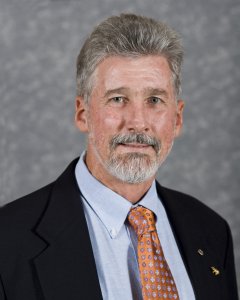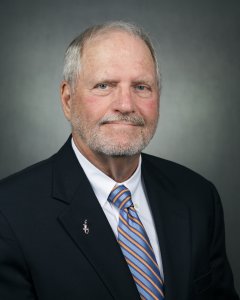
For years Gene McAvoy kept a dark blue suit jacket on a hook behind the door in his Extension office. He wore it to farmers’ funerals.
He considered attending funerals a gesture of respect. It was also yet another place to talk to other farmers.
Gene called his job as University of Florida Institute of Food and Agricultural Sciences Hendry County Extension director a “lifestyle.” Home is a Farm Bureau-insured 40-acre ranch. Nights and weekends are at county board meetings where he serves as treasurer, District 8 meetings, Young Farmer and Rancher events, state Vegetable Advisory Committee meetings and special events such as the Sweet Corn Fiesta at which he represents Farm Bureau.
In a sense, the Farm Bureau honors one of its own in recognizing Gene as Extension professional of the year at the annual convention in Orlando this month. It’s hard to think of an Extension agent for whom this would be more meaningful.
The award ceremony and convention are yet another chance for him to talk with farmers from all over the state. Not only that, but Gene usually attends the convention anyway at this own expense, and the award comes with a free night’s hotel stay!
When he’s not with farmers and ranchers, he’s communicating to them or for them. For more than two decades, Gene has run the South Florida Veg Hotline, which started as a printed newsletter and evolved into an electronic message that gets sent out almost daily. It’s got regulatory information, label changes, industry trends, new technology and more.
Then there’s his Pest-of-the-Month column. Unfortunately, he’s never had a shortage of subjects to write about.
Equally important is his work speaking to people other than you – people who don’t live or work on farms. He tells the story of agriculture one small group at a time.
Sometimes he’s telling nursing students to put away their preconceived notion of farm workers being poisoned by pesticides and instead to look out for heat exhaustion, back strains or branches poking them in the eyes as they reach for fruit on branches. Other times, he’s showing legislators how what they do in Tallahassee affects the fields and groves of LaBelle.
He has shown Audubon groups farmland that doubles as valuable habitat to birds. He reads agriculture-related stories aloud in elementary school classrooms. He takes winter visitors on all-day tours of farm country, with stops at citrus groves, sugarcane fields, vegetable farms and packing houses.
Gene knows the value of showing up. It expresses solidarity with the business. It’s a way to learn what’s important to farmers. It’s a way to make sure what you’re doing is relevant.
That was certainly the case when he was among the first to show up at wind- and rain-ravaged farms in the wake of Hurricane Irma. His firsthand accounts of what he saw helped farmers make the case for disaster relief.
The respect he has shown farmers was reflected back on him when he retired from his Extension job in August. More than 200 people came to the LaBelle Civic Center for his retirement party.
He didn’t stay retired long. I’ve appointed him associate director for stakeholder relations at the UF/IFAS Southwest Florida Research and Education Center in Immokalee. This summer he became president of the National Association of County Agricultural Agents.
In retirement Gene’s job title has changed. His lifestyle is unlikely to change much at all. He’ll continue to serve as treasurer for the Hendry County Farm Bureau. You’ll still see him in Orlando, LaBelle and Immokalee. Please congratulate him when you do.

Jack Payne is the University of Florida’s senior vice president for agriculture and natural resources and leader of the Institute of Food and Agricultural Sciences.
[email protected]
@JackPayneIFAS
